Comprehensive Report on the Medical Insurance Specialist Profession
VerifiedAdded on 2023/04/21
|8
|1731
|269
Report
AI Summary
This report delves into the career of a medical insurance specialist, detailing the responsibilities of presenting insurance claims for medical service reimbursements. It covers the necessary qualifications, including education (high school diploma and post-secondary training in health billing codes), experience (preferably one year or more), and certifications. The report emphasizes the importance of medical and insurance terminologies, knowledge of health insurance laws, and familiarity with Medicare and Medicaid. It also outlines essential skills such as clinical, communication, and conflict management skills. The report highlights the pros, such as flexible work locations and opportunities for continuous learning, and cons, including the cost of education and the potential for monotony. The report also references key literature on the subject, providing a comprehensive overview of the field.
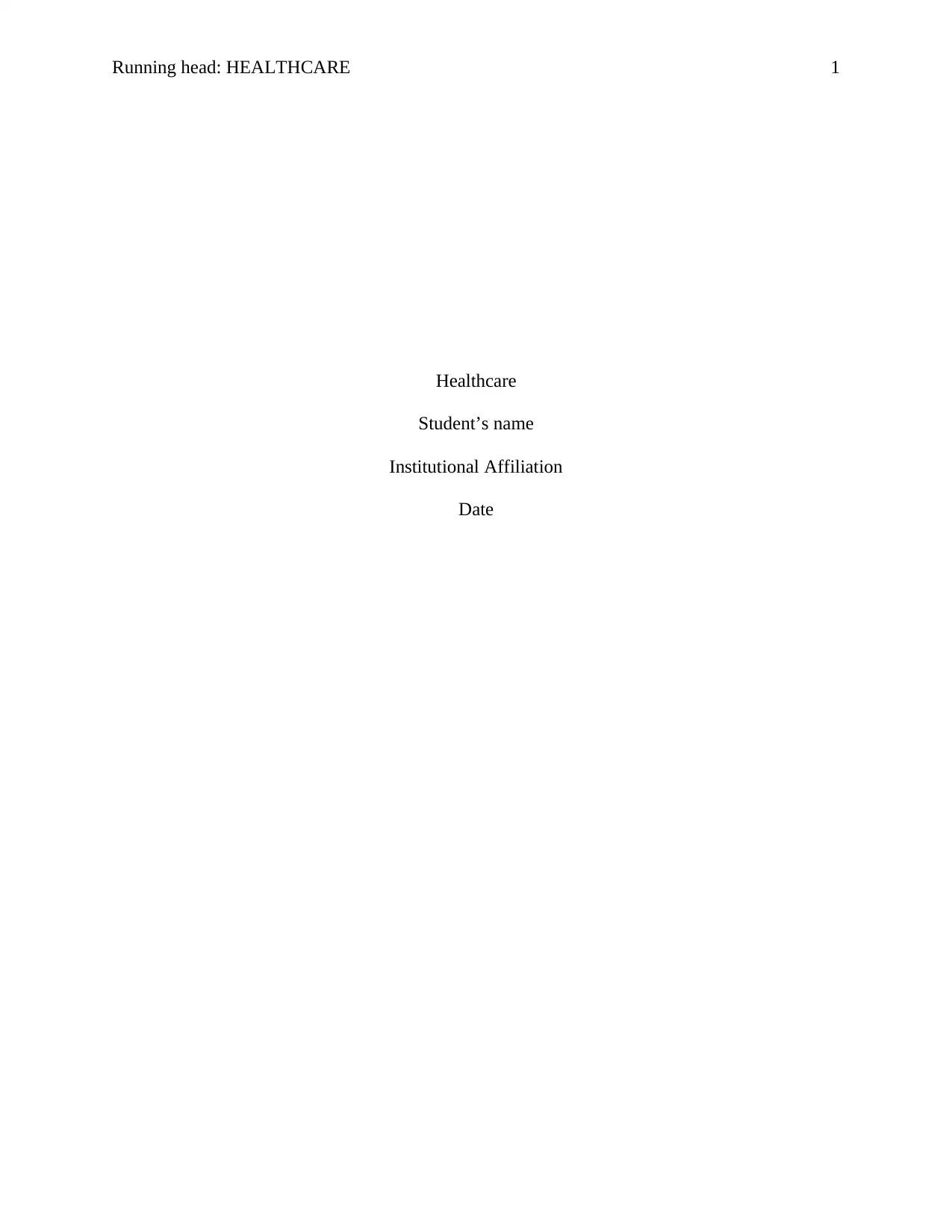
Running head: HEALTHCARE 1
Healthcare
Student’s name
Institutional Affiliation
Date
Healthcare
Student’s name
Institutional Affiliation
Date
Paraphrase This Document
Need a fresh take? Get an instant paraphrase of this document with our AI Paraphraser
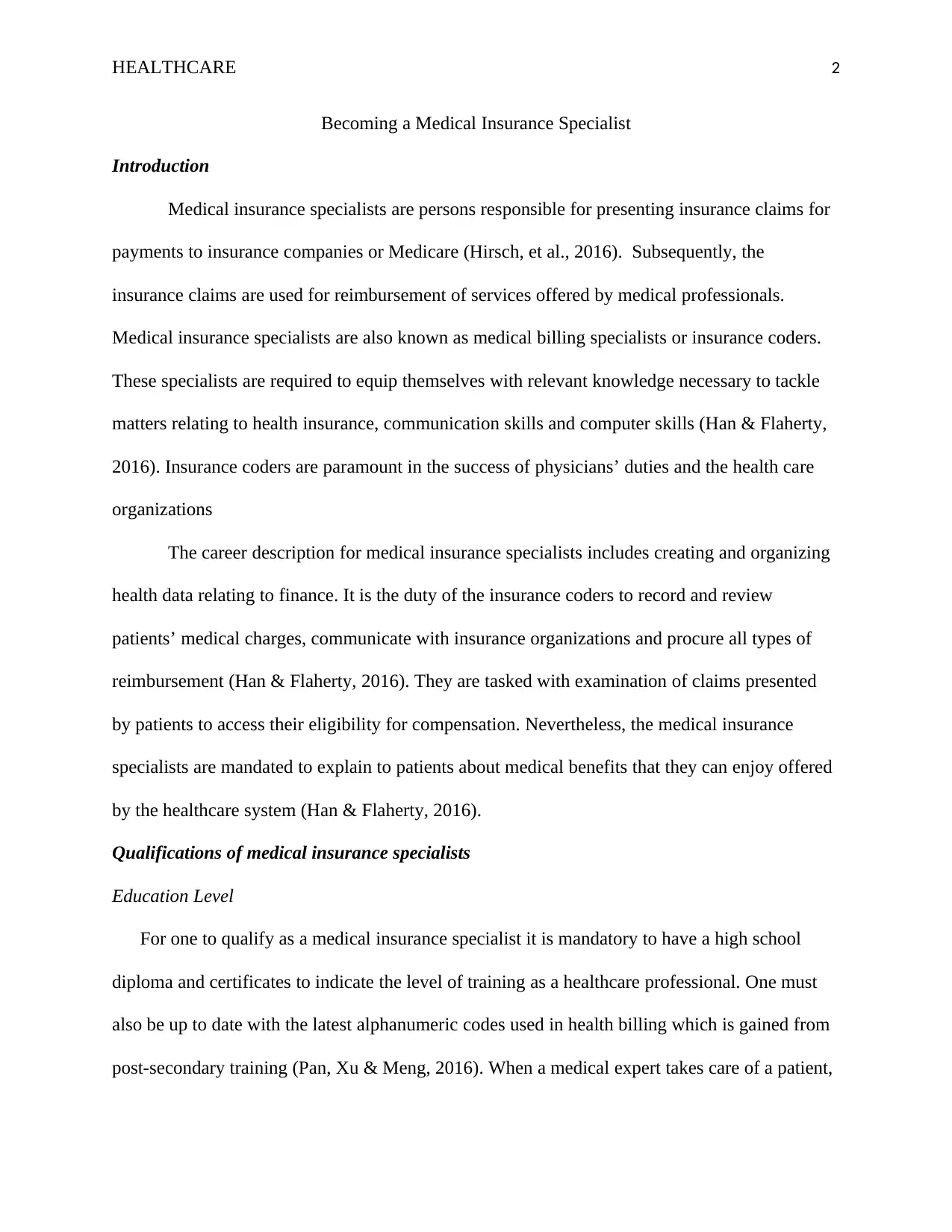
HEALTHCARE 2
Becoming a Medical Insurance Specialist
Introduction
Medical insurance specialists are persons responsible for presenting insurance claims for
payments to insurance companies or Medicare (Hirsch, et al., 2016). Subsequently, the
insurance claims are used for reimbursement of services offered by medical professionals.
Medical insurance specialists are also known as medical billing specialists or insurance coders.
These specialists are required to equip themselves with relevant knowledge necessary to tackle
matters relating to health insurance, communication skills and computer skills (Han & Flaherty,
2016). Insurance coders are paramount in the success of physicians’ duties and the health care
organizations
The career description for medical insurance specialists includes creating and organizing
health data relating to finance. It is the duty of the insurance coders to record and review
patients’ medical charges, communicate with insurance organizations and procure all types of
reimbursement (Han & Flaherty, 2016). They are tasked with examination of claims presented
by patients to access their eligibility for compensation. Nevertheless, the medical insurance
specialists are mandated to explain to patients about medical benefits that they can enjoy offered
by the healthcare system (Han & Flaherty, 2016).
Qualifications of medical insurance specialists
Education Level
For one to qualify as a medical insurance specialist it is mandatory to have a high school
diploma and certificates to indicate the level of training as a healthcare professional. One must
also be up to date with the latest alphanumeric codes used in health billing which is gained from
post-secondary training (Pan, Xu & Meng, 2016). When a medical expert takes care of a patient,
Becoming a Medical Insurance Specialist
Introduction
Medical insurance specialists are persons responsible for presenting insurance claims for
payments to insurance companies or Medicare (Hirsch, et al., 2016). Subsequently, the
insurance claims are used for reimbursement of services offered by medical professionals.
Medical insurance specialists are also known as medical billing specialists or insurance coders.
These specialists are required to equip themselves with relevant knowledge necessary to tackle
matters relating to health insurance, communication skills and computer skills (Han & Flaherty,
2016). Insurance coders are paramount in the success of physicians’ duties and the health care
organizations
The career description for medical insurance specialists includes creating and organizing
health data relating to finance. It is the duty of the insurance coders to record and review
patients’ medical charges, communicate with insurance organizations and procure all types of
reimbursement (Han & Flaherty, 2016). They are tasked with examination of claims presented
by patients to access their eligibility for compensation. Nevertheless, the medical insurance
specialists are mandated to explain to patients about medical benefits that they can enjoy offered
by the healthcare system (Han & Flaherty, 2016).
Qualifications of medical insurance specialists
Education Level
For one to qualify as a medical insurance specialist it is mandatory to have a high school
diploma and certificates to indicate the level of training as a healthcare professional. One must
also be up to date with the latest alphanumeric codes used in health billing which is gained from
post-secondary training (Pan, Xu & Meng, 2016). When a medical expert takes care of a patient,
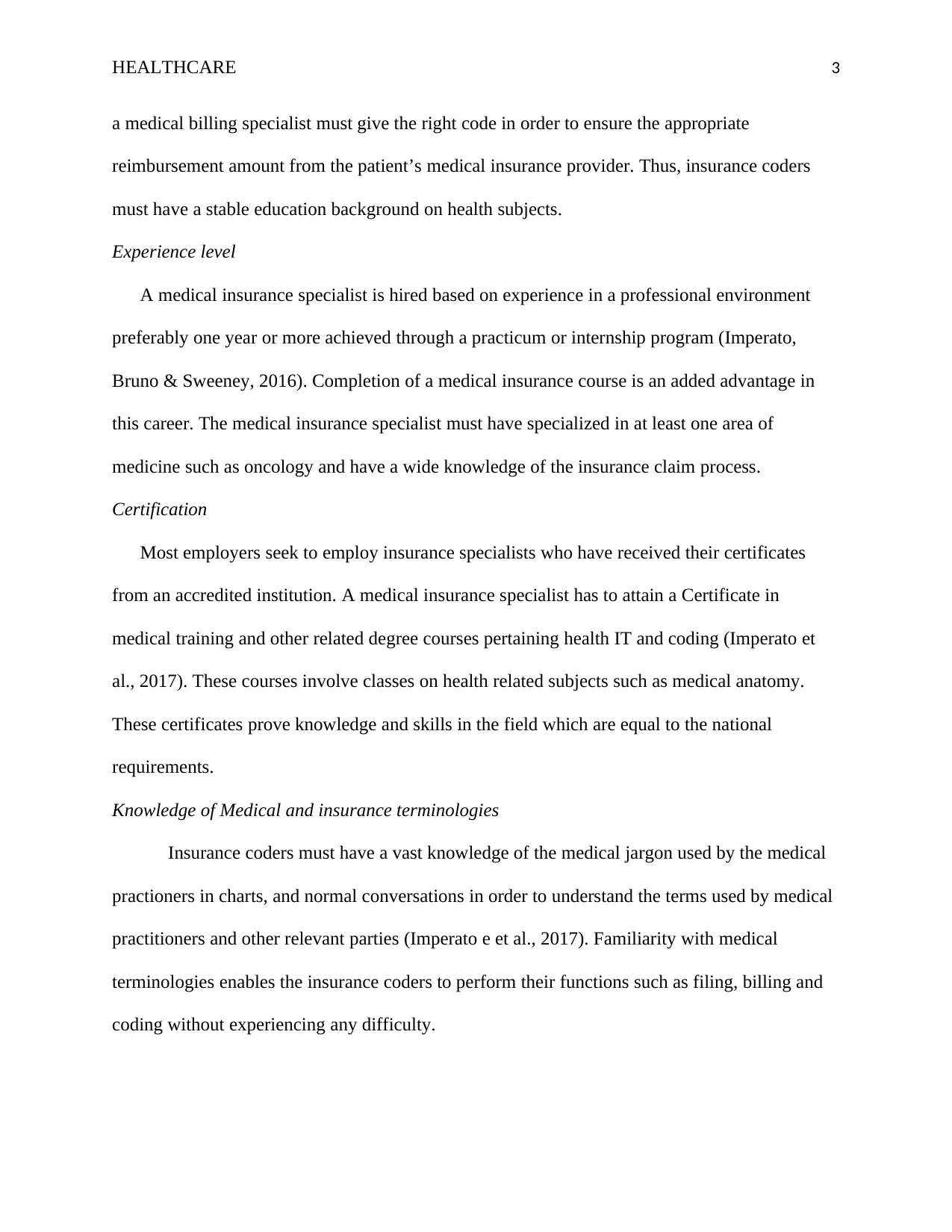
HEALTHCARE 3
a medical billing specialist must give the right code in order to ensure the appropriate
reimbursement amount from the patient’s medical insurance provider. Thus, insurance coders
must have a stable education background on health subjects.
Experience level
A medical insurance specialist is hired based on experience in a professional environment
preferably one year or more achieved through a practicum or internship program (Imperato,
Bruno & Sweeney, 2016). Completion of a medical insurance course is an added advantage in
this career. The medical insurance specialist must have specialized in at least one area of
medicine such as oncology and have a wide knowledge of the insurance claim process.
Certification
Most employers seek to employ insurance specialists who have received their certificates
from an accredited institution. A medical insurance specialist has to attain a Certificate in
medical training and other related degree courses pertaining health IT and coding (Imperato et
al., 2017). These courses involve classes on health related subjects such as medical anatomy.
These certificates prove knowledge and skills in the field which are equal to the national
requirements.
Knowledge of Medical and insurance terminologies
Insurance coders must have a vast knowledge of the medical jargon used by the medical
practioners in charts, and normal conversations in order to understand the terms used by medical
practitioners and other relevant parties (Imperato e et al., 2017). Familiarity with medical
terminologies enables the insurance coders to perform their functions such as filing, billing and
coding without experiencing any difficulty.
a medical billing specialist must give the right code in order to ensure the appropriate
reimbursement amount from the patient’s medical insurance provider. Thus, insurance coders
must have a stable education background on health subjects.
Experience level
A medical insurance specialist is hired based on experience in a professional environment
preferably one year or more achieved through a practicum or internship program (Imperato,
Bruno & Sweeney, 2016). Completion of a medical insurance course is an added advantage in
this career. The medical insurance specialist must have specialized in at least one area of
medicine such as oncology and have a wide knowledge of the insurance claim process.
Certification
Most employers seek to employ insurance specialists who have received their certificates
from an accredited institution. A medical insurance specialist has to attain a Certificate in
medical training and other related degree courses pertaining health IT and coding (Imperato et
al., 2017). These courses involve classes on health related subjects such as medical anatomy.
These certificates prove knowledge and skills in the field which are equal to the national
requirements.
Knowledge of Medical and insurance terminologies
Insurance coders must have a vast knowledge of the medical jargon used by the medical
practioners in charts, and normal conversations in order to understand the terms used by medical
practitioners and other relevant parties (Imperato e et al., 2017). Familiarity with medical
terminologies enables the insurance coders to perform their functions such as filing, billing and
coding without experiencing any difficulty.
⊘ This is a preview!⊘
Do you want full access?
Subscribe today to unlock all pages.

Trusted by 1+ million students worldwide
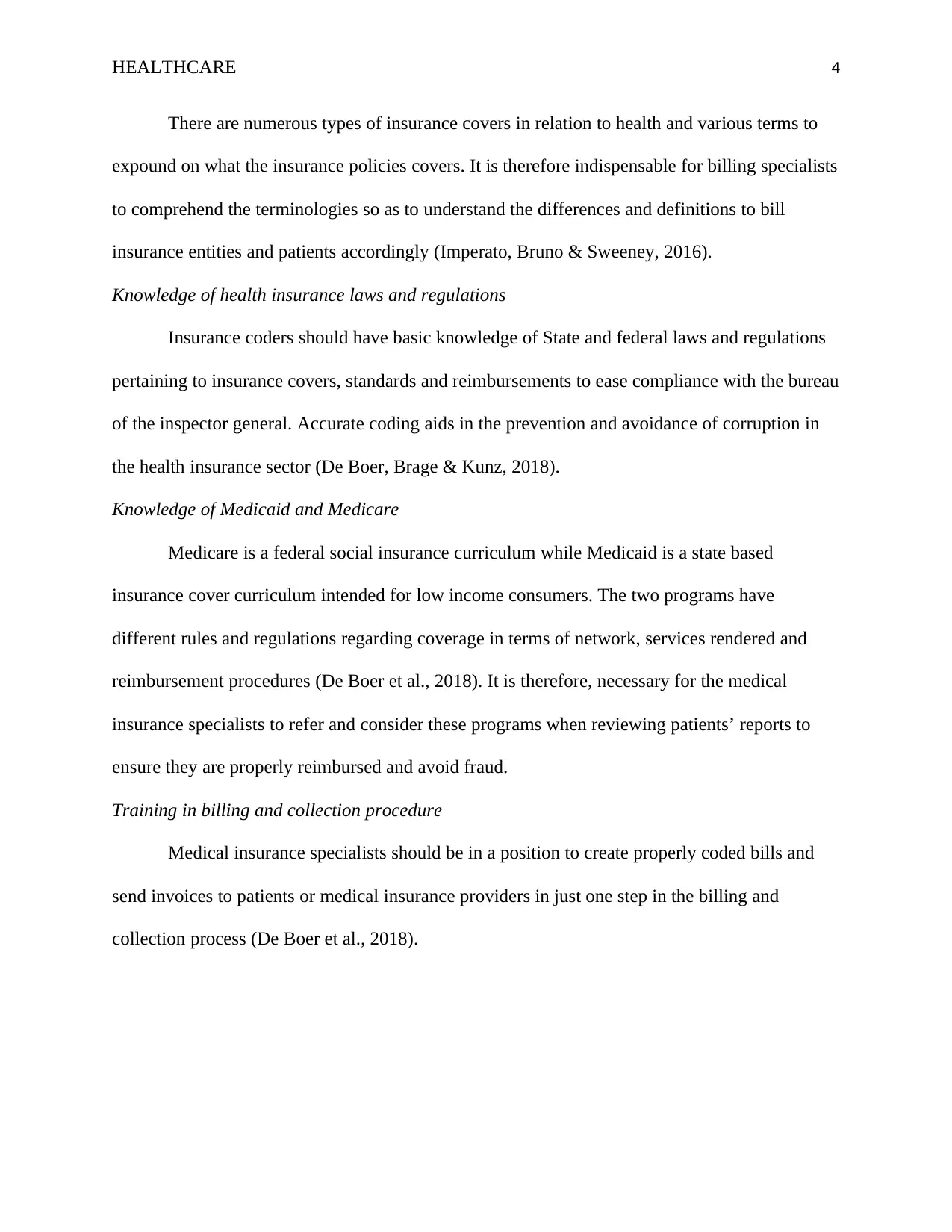
HEALTHCARE 4
There are numerous types of insurance covers in relation to health and various terms to
expound on what the insurance policies covers. It is therefore indispensable for billing specialists
to comprehend the terminologies so as to understand the differences and definitions to bill
insurance entities and patients accordingly (Imperato, Bruno & Sweeney, 2016).
Knowledge of health insurance laws and regulations
Insurance coders should have basic knowledge of State and federal laws and regulations
pertaining to insurance covers, standards and reimbursements to ease compliance with the bureau
of the inspector general. Accurate coding aids in the prevention and avoidance of corruption in
the health insurance sector (De Boer, Brage & Kunz, 2018).
Knowledge of Medicaid and Medicare
Medicare is a federal social insurance curriculum while Medicaid is a state based
insurance cover curriculum intended for low income consumers. The two programs have
different rules and regulations regarding coverage in terms of network, services rendered and
reimbursement procedures (De Boer et al., 2018). It is therefore, necessary for the medical
insurance specialists to refer and consider these programs when reviewing patients’ reports to
ensure they are properly reimbursed and avoid fraud.
Training in billing and collection procedure
Medical insurance specialists should be in a position to create properly coded bills and
send invoices to patients or medical insurance providers in just one step in the billing and
collection process (De Boer et al., 2018).
There are numerous types of insurance covers in relation to health and various terms to
expound on what the insurance policies covers. It is therefore indispensable for billing specialists
to comprehend the terminologies so as to understand the differences and definitions to bill
insurance entities and patients accordingly (Imperato, Bruno & Sweeney, 2016).
Knowledge of health insurance laws and regulations
Insurance coders should have basic knowledge of State and federal laws and regulations
pertaining to insurance covers, standards and reimbursements to ease compliance with the bureau
of the inspector general. Accurate coding aids in the prevention and avoidance of corruption in
the health insurance sector (De Boer, Brage & Kunz, 2018).
Knowledge of Medicaid and Medicare
Medicare is a federal social insurance curriculum while Medicaid is a state based
insurance cover curriculum intended for low income consumers. The two programs have
different rules and regulations regarding coverage in terms of network, services rendered and
reimbursement procedures (De Boer et al., 2018). It is therefore, necessary for the medical
insurance specialists to refer and consider these programs when reviewing patients’ reports to
ensure they are properly reimbursed and avoid fraud.
Training in billing and collection procedure
Medical insurance specialists should be in a position to create properly coded bills and
send invoices to patients or medical insurance providers in just one step in the billing and
collection process (De Boer et al., 2018).
Paraphrase This Document
Need a fresh take? Get an instant paraphrase of this document with our AI Paraphraser
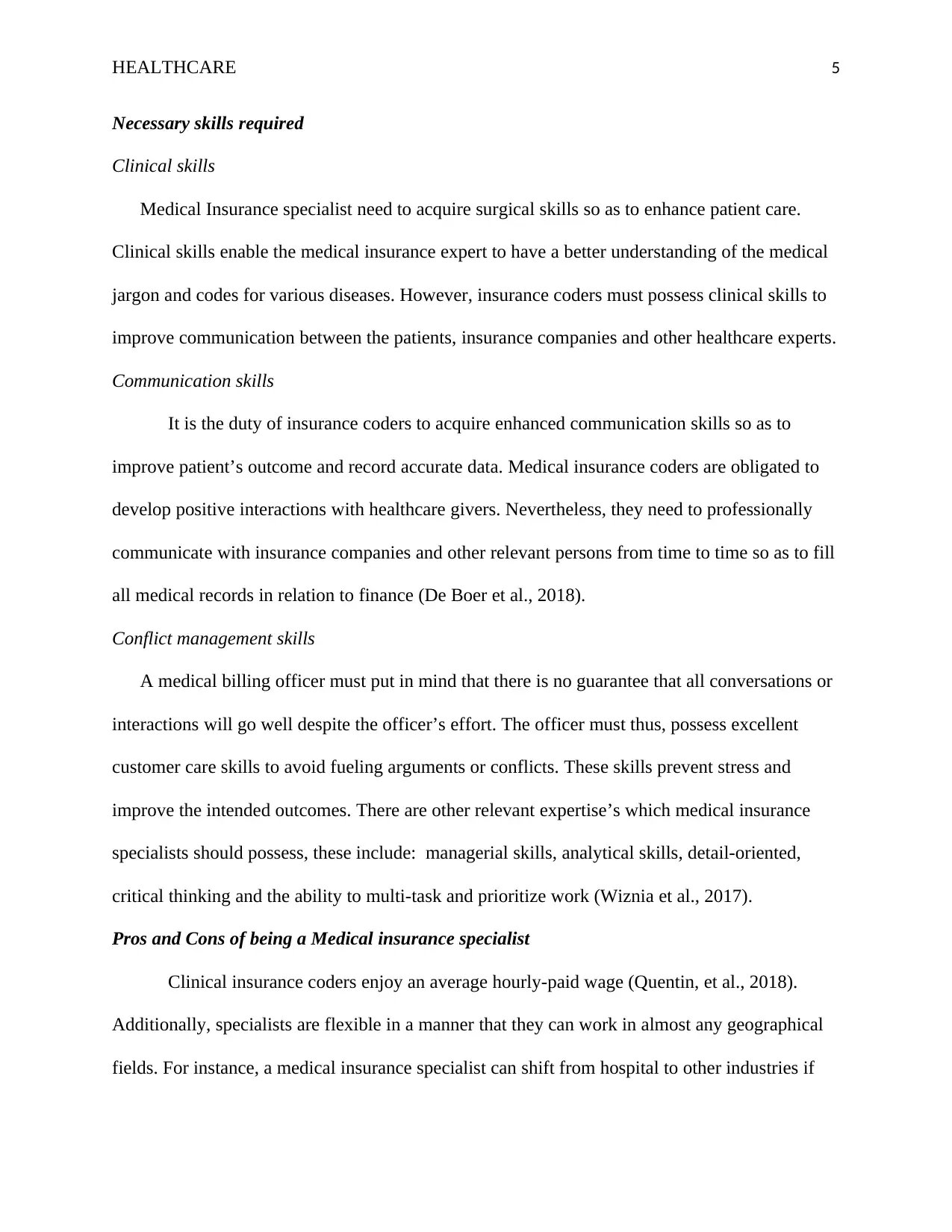
HEALTHCARE 5
Necessary skills required
Clinical skills
Medical Insurance specialist need to acquire surgical skills so as to enhance patient care.
Clinical skills enable the medical insurance expert to have a better understanding of the medical
jargon and codes for various diseases. However, insurance coders must possess clinical skills to
improve communication between the patients, insurance companies and other healthcare experts.
Communication skills
It is the duty of insurance coders to acquire enhanced communication skills so as to
improve patient’s outcome and record accurate data. Medical insurance coders are obligated to
develop positive interactions with healthcare givers. Nevertheless, they need to professionally
communicate with insurance companies and other relevant persons from time to time so as to fill
all medical records in relation to finance (De Boer et al., 2018).
Conflict management skills
A medical billing officer must put in mind that there is no guarantee that all conversations or
interactions will go well despite the officer’s effort. The officer must thus, possess excellent
customer care skills to avoid fueling arguments or conflicts. These skills prevent stress and
improve the intended outcomes. There are other relevant expertise’s which medical insurance
specialists should possess, these include: managerial skills, analytical skills, detail-oriented,
critical thinking and the ability to multi-task and prioritize work (Wiznia et al., 2017).
Pros and Cons of being a Medical insurance specialist
Clinical insurance coders enjoy an average hourly-paid wage (Quentin, et al., 2018).
Additionally, specialists are flexible in a manner that they can work in almost any geographical
fields. For instance, a medical insurance specialist can shift from hospital to other industries if
Necessary skills required
Clinical skills
Medical Insurance specialist need to acquire surgical skills so as to enhance patient care.
Clinical skills enable the medical insurance expert to have a better understanding of the medical
jargon and codes for various diseases. However, insurance coders must possess clinical skills to
improve communication between the patients, insurance companies and other healthcare experts.
Communication skills
It is the duty of insurance coders to acquire enhanced communication skills so as to
improve patient’s outcome and record accurate data. Medical insurance coders are obligated to
develop positive interactions with healthcare givers. Nevertheless, they need to professionally
communicate with insurance companies and other relevant persons from time to time so as to fill
all medical records in relation to finance (De Boer et al., 2018).
Conflict management skills
A medical billing officer must put in mind that there is no guarantee that all conversations or
interactions will go well despite the officer’s effort. The officer must thus, possess excellent
customer care skills to avoid fueling arguments or conflicts. These skills prevent stress and
improve the intended outcomes. There are other relevant expertise’s which medical insurance
specialists should possess, these include: managerial skills, analytical skills, detail-oriented,
critical thinking and the ability to multi-task and prioritize work (Wiznia et al., 2017).
Pros and Cons of being a Medical insurance specialist
Clinical insurance coders enjoy an average hourly-paid wage (Quentin, et al., 2018).
Additionally, specialists are flexible in a manner that they can work in almost any geographical
fields. For instance, a medical insurance specialist can shift from hospital to other industries if
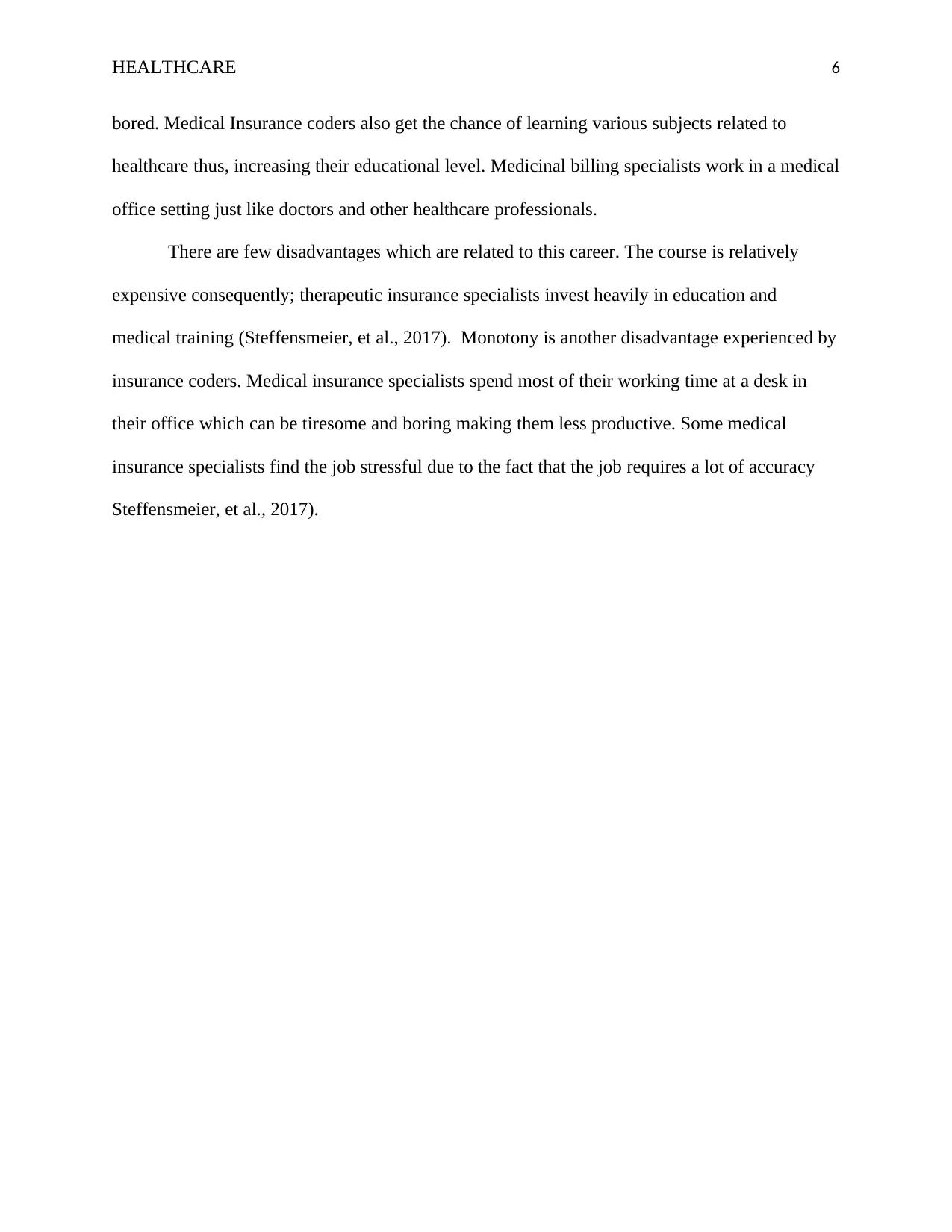
HEALTHCARE 6
bored. Medical Insurance coders also get the chance of learning various subjects related to
healthcare thus, increasing their educational level. Medicinal billing specialists work in a medical
office setting just like doctors and other healthcare professionals.
There are few disadvantages which are related to this career. The course is relatively
expensive consequently; therapeutic insurance specialists invest heavily in education and
medical training (Steffensmeier, et al., 2017). Monotony is another disadvantage experienced by
insurance coders. Medical insurance specialists spend most of their working time at a desk in
their office which can be tiresome and boring making them less productive. Some medical
insurance specialists find the job stressful due to the fact that the job requires a lot of accuracy
Steffensmeier, et al., 2017).
bored. Medical Insurance coders also get the chance of learning various subjects related to
healthcare thus, increasing their educational level. Medicinal billing specialists work in a medical
office setting just like doctors and other healthcare professionals.
There are few disadvantages which are related to this career. The course is relatively
expensive consequently; therapeutic insurance specialists invest heavily in education and
medical training (Steffensmeier, et al., 2017). Monotony is another disadvantage experienced by
insurance coders. Medical insurance specialists spend most of their working time at a desk in
their office which can be tiresome and boring making them less productive. Some medical
insurance specialists find the job stressful due to the fact that the job requires a lot of accuracy
Steffensmeier, et al., 2017).
⊘ This is a preview!⊘
Do you want full access?
Subscribe today to unlock all pages.

Trusted by 1+ million students worldwide
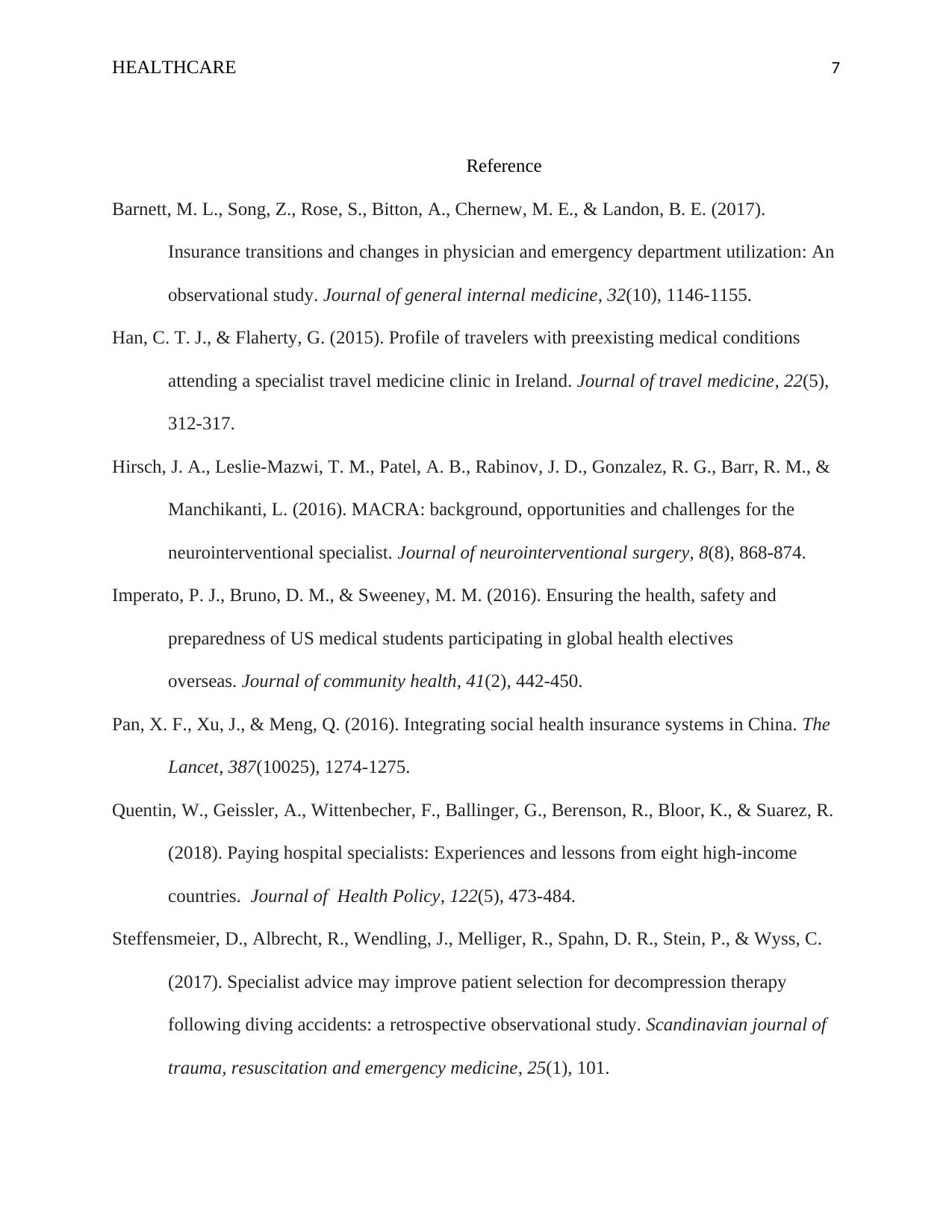
HEALTHCARE 7
Reference
Barnett, M. L., Song, Z., Rose, S., Bitton, A., Chernew, M. E., & Landon, B. E. (2017).
Insurance transitions and changes in physician and emergency department utilization: An
observational study. Journal of general internal medicine, 32(10), 1146-1155.
Han, C. T. J., & Flaherty, G. (2015). Profile of travelers with preexisting medical conditions
attending a specialist travel medicine clinic in Ireland. Journal of travel medicine, 22(5),
312-317.
Hirsch, J. A., Leslie-Mazwi, T. M., Patel, A. B., Rabinov, J. D., Gonzalez, R. G., Barr, R. M., &
Manchikanti, L. (2016). MACRA: background, opportunities and challenges for the
neurointerventional specialist. Journal of neurointerventional surgery, 8(8), 868-874.
Imperato, P. J., Bruno, D. M., & Sweeney, M. M. (2016). Ensuring the health, safety and
preparedness of US medical students participating in global health electives
overseas. Journal of community health, 41(2), 442-450.
Pan, X. F., Xu, J., & Meng, Q. (2016). Integrating social health insurance systems in China. The
Lancet, 387(10025), 1274-1275.
Quentin, W., Geissler, A., Wittenbecher, F., Ballinger, G., Berenson, R., Bloor, K., & Suarez, R.
(2018). Paying hospital specialists: Experiences and lessons from eight high-income
countries. Journal of Health Policy, 122(5), 473-484.
Steffensmeier, D., Albrecht, R., Wendling, J., Melliger, R., Spahn, D. R., Stein, P., & Wyss, C.
(2017). Specialist advice may improve patient selection for decompression therapy
following diving accidents: a retrospective observational study. Scandinavian journal of
trauma, resuscitation and emergency medicine, 25(1), 101.
Reference
Barnett, M. L., Song, Z., Rose, S., Bitton, A., Chernew, M. E., & Landon, B. E. (2017).
Insurance transitions and changes in physician and emergency department utilization: An
observational study. Journal of general internal medicine, 32(10), 1146-1155.
Han, C. T. J., & Flaherty, G. (2015). Profile of travelers with preexisting medical conditions
attending a specialist travel medicine clinic in Ireland. Journal of travel medicine, 22(5),
312-317.
Hirsch, J. A., Leslie-Mazwi, T. M., Patel, A. B., Rabinov, J. D., Gonzalez, R. G., Barr, R. M., &
Manchikanti, L. (2016). MACRA: background, opportunities and challenges for the
neurointerventional specialist. Journal of neurointerventional surgery, 8(8), 868-874.
Imperato, P. J., Bruno, D. M., & Sweeney, M. M. (2016). Ensuring the health, safety and
preparedness of US medical students participating in global health electives
overseas. Journal of community health, 41(2), 442-450.
Pan, X. F., Xu, J., & Meng, Q. (2016). Integrating social health insurance systems in China. The
Lancet, 387(10025), 1274-1275.
Quentin, W., Geissler, A., Wittenbecher, F., Ballinger, G., Berenson, R., Bloor, K., & Suarez, R.
(2018). Paying hospital specialists: Experiences and lessons from eight high-income
countries. Journal of Health Policy, 122(5), 473-484.
Steffensmeier, D., Albrecht, R., Wendling, J., Melliger, R., Spahn, D. R., Stein, P., & Wyss, C.
(2017). Specialist advice may improve patient selection for decompression therapy
following diving accidents: a retrospective observational study. Scandinavian journal of
trauma, resuscitation and emergency medicine, 25(1), 101.
Paraphrase This Document
Need a fresh take? Get an instant paraphrase of this document with our AI Paraphraser
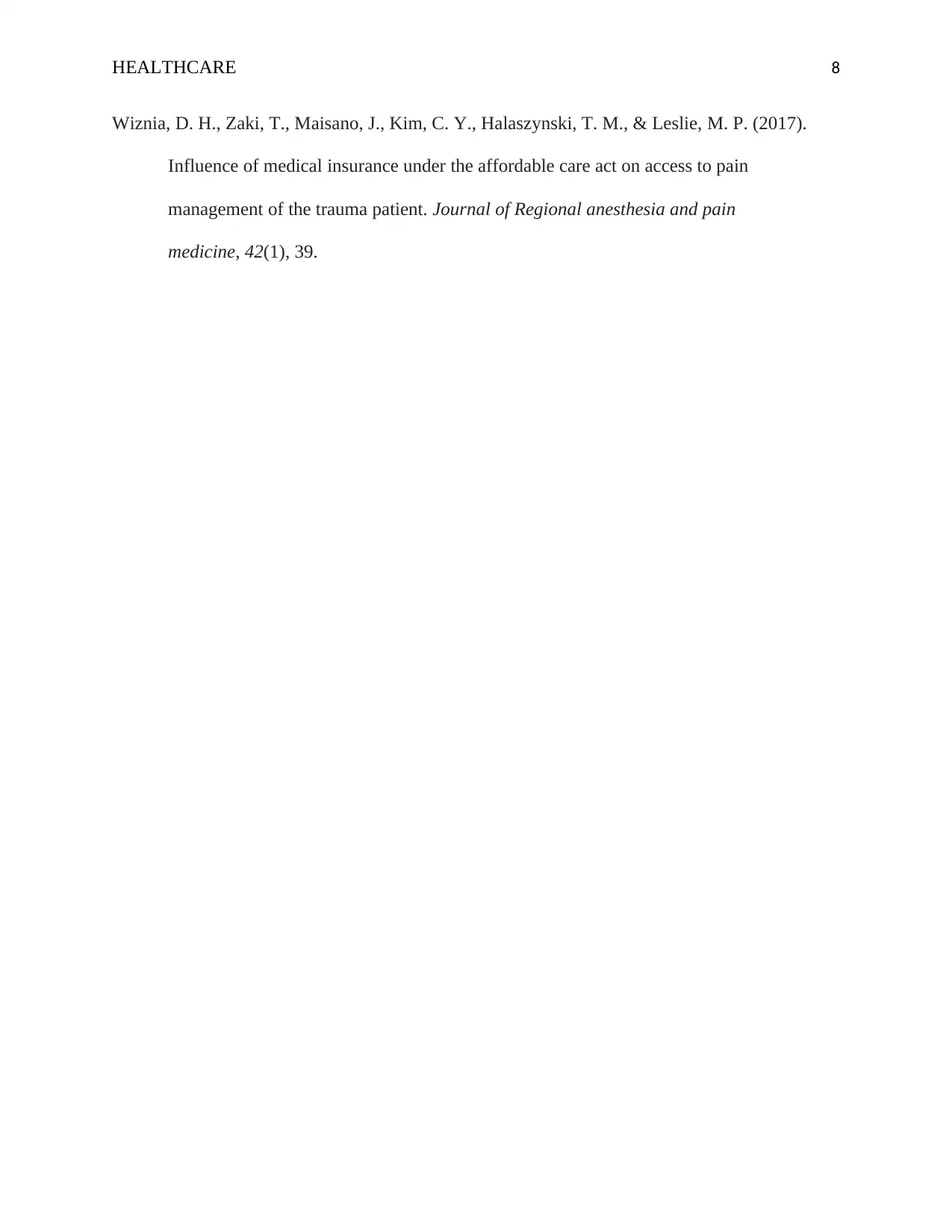
HEALTHCARE 8
Wiznia, D. H., Zaki, T., Maisano, J., Kim, C. Y., Halaszynski, T. M., & Leslie, M. P. (2017).
Influence of medical insurance under the affordable care act on access to pain
management of the trauma patient. Journal of Regional anesthesia and pain
medicine, 42(1), 39.
Wiznia, D. H., Zaki, T., Maisano, J., Kim, C. Y., Halaszynski, T. M., & Leslie, M. P. (2017).
Influence of medical insurance under the affordable care act on access to pain
management of the trauma patient. Journal of Regional anesthesia and pain
medicine, 42(1), 39.
1 out of 8
Related Documents
Your All-in-One AI-Powered Toolkit for Academic Success.
+13062052269
info@desklib.com
Available 24*7 on WhatsApp / Email
![[object Object]](/_next/static/media/star-bottom.7253800d.svg)
Unlock your academic potential
Copyright © 2020–2026 A2Z Services. All Rights Reserved. Developed and managed by ZUCOL.




